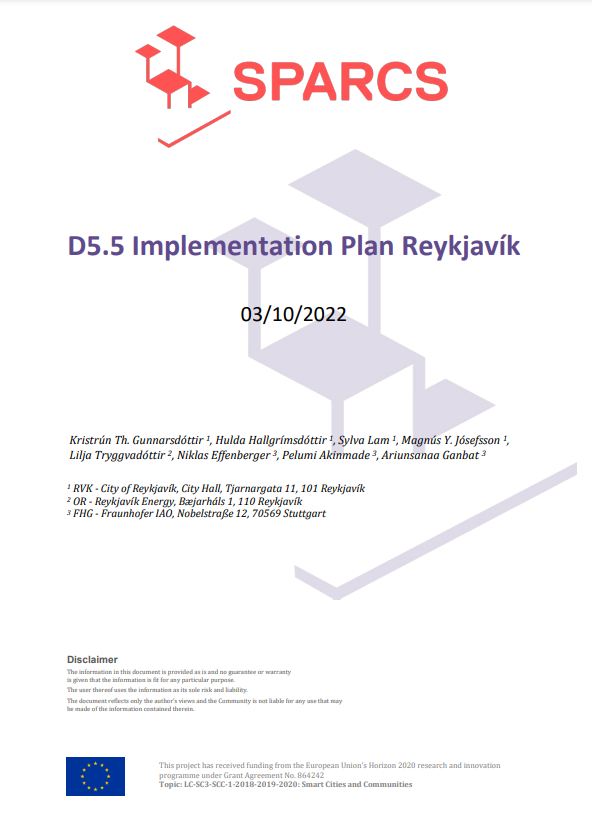D5.05 Implementation Plan Reykjavík
This Implementation Plan is the outcome of long-term extensive efforts and successful collaboration between SPARCS partners, especially Fraunhofer (Stuttgart), the City of Reykjavík and Reykjavík Energy. The plan draws together the building blocks for choosing and implementing demonstrator projects in Reykjavík, detailing that those choices draw not only upon the profiling of the city on these pages, in matters of energy, mobility, waste management and smart city developments. They draw upon the activities that are reported here as well, starting with future envisioning to depict what the City of Reykjavík could look like in 2050. They draw upon the outcomes of onsite and virtual assessments, interviews, co-creation activities, structured consultations and deliberation workshops, all of which helped to build a repertoire of project ideas, that later needed filtering down in preparation for a final innovation workshop to determine the winning choices.
For roughly two years now, the developments in Reykjavík have been inspired greatly by knowledge exchange and learning from projects carried out by the two Lighthouse Cities of the SPARCS project, each of which is demonstrating how energy transformation of cities into a carbon-neutral communities can be socially and economically viable. Reykjavík is so-called Follower City within the consortium. That said, the City of Reykjavík has issued a number of policies and action plans in recent years, on reducing greenhouse gas emissions, on climate action and achieving carbon-neutrality. It has committed to join other cities in working across commercial, grass-root and civil society organisations, to put pressure on state legislatures as well as the private and public sectors. For example, Reykjavík is member city in the Horizon Europe Mission, climate-neutral and smart cities. The administration has also issued a Green Deal, based on its European counterpart and an important roadmap to economic recovery after Covid. It focuses on economic, environmental and social dimensions of sustainability with substantive implications for investments in green and smart city infrastructures and other societal developments that are required to ensure that no one is left behind.
All of these commitments get mention in the reporting here, if only to indicate good intentions, given that progress tends to be slower than we hope for. The reader will learn about the quantitative profile for the city as well as its qualitative characteristics. The reader will come across raw data from sources, covering general city stats, energy production and use, mobility, smart city developments and more, with focus on quantifiable sustainability performance indicators in the sectors of governance, energy, waste, emissions and transportation.
The elaborate profiling presented here gives clear indications of where the key challenges lie for the City of Reykjavík on its journey towards carbon neutrality. One could also argue that subject experts, professionals and general publics in Iceland already assume which areas are very minor concern, if an issue at all, i.e., house heating and electricity production and use. These factors, among others, confine the depictions that seem important, reasonable and doable, and this became evident early on in future visioning and later in the kind of project ideas the filled the original register. All in all, we argue that the implementation plan we introduce here and which is a direct result of the activities also reported, is a testament to excellent insights, knowledge and experience, great collaboration, not to mention immensely creative effort.

